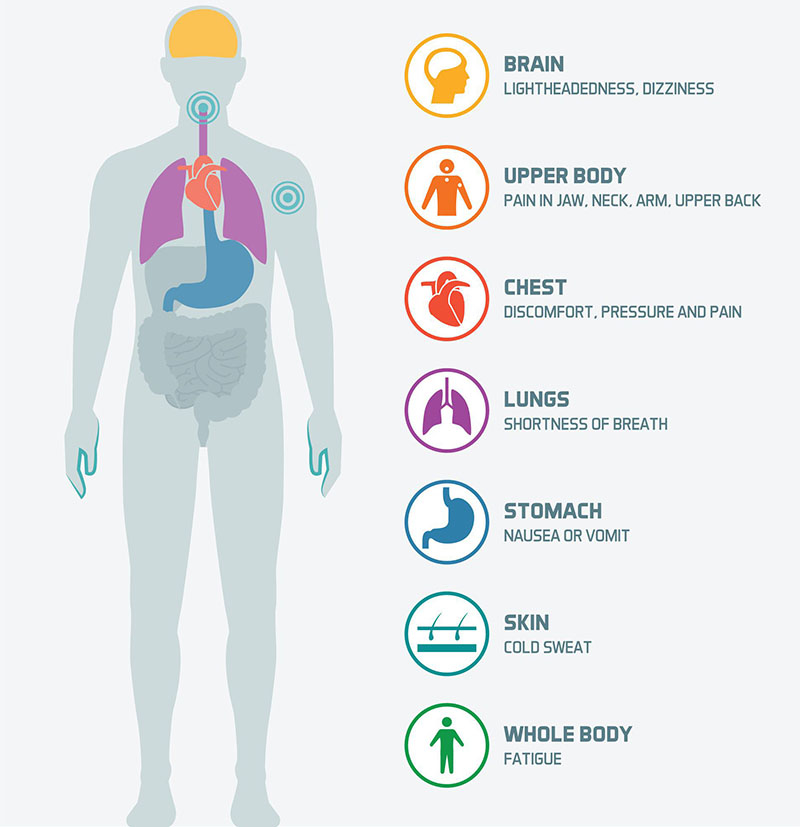

It also reviews relevant clinical information concerning GERD-related chronic cough and asthma. This clinical review examines the potential pathophysiological mechanisms of pulmonary manifestations of GERD. The acid can cause throat irritation, postnasal drip and hoarseness, as well as recurrent cough, chest congestion and lung inflammation leading to asthma and/or bronchitis/ pneumonia. If the gastric acid reaches the back of the throat, it may cause a bitter taste in the mouth and/or aspiration of the gastric acid into the lungs. Local irritation in the esophagus can cause symptoms that vary from indigestion, like chest discomfort and abdominal pain, to coughing and wheezing. Patients may present with symptoms involving the pulmonary system noncardiac chest pain and ear, nose and throat disorders. A primary care physician often encounters patients with extra esophageal manifestations of GERD in the absence of heartburn. The physiological link between GERD and pulmonary disease has been extensively studied in chronic cough and asthma. If your symptoms don’t improve with lifestyle changes or after you try over-the-counter medications, your doctor will be able to help you with next steps, including prescription-strength options like proton-pump inhibitors.Gastroesophageal reflux disease (GERD) may cause, trigger or exacerbate many pulmonary diseases. Cutting out trigger foods and taking over-the-counter antacids might be enough to quiet down your unruly stomach acids, but you can always talk to your doctor to find the best treatment plan for you. (The last two symptoms are signs of bleeding in the digestive tract.)Ĭhest pain can signal heart trouble, meaning you should also seek immediate medical attention if you suspect you may be having a heart attack-especially if the pain comes on with physical activity, according to the AGA.Īcid reflux can also have a big impact on your quality of life, even without potentially dangerous complications. Talk to your doctor if you experience a loss of appetite, persistent vomiting, problems swallowing, unexplained weight loss, vomit that looks like coffee grounds, or bloody or black stools, per the NIH.

What’s more, people who have GERD also have a slightly higher esophageal cancer risk. If that happens, you can end up with “a nasty case of pneumonia,” Dr. They can also make their way into your lungs.

When stomach acids escape your belly, they don’t just irritate your throat. Not sure what you’re dealing with? Ahead, the most common (and unusual) signs of acid reflux that go way beyond bouts of heartburn.Īlthough acid reflux is not life-threatening, some symptoms could be signs that the condition has become chronic, meaning your risk of complications can increase. “I also see reflux being blamed for symptoms that have nothing to do with it,” Dr. The condition can be complicated, and it is not always the answer to related health issues or that weird feeling in the throat. But reflux can cause less obvious symptoms, too, says Joseph Murray, M.D., a gastroenterologist who researches esophageal disorders at Mayo Clinic. Think: fried and fatty foods, chocolate, tomato sauce, alcohol, coffee, carbonated drinks, and vinegar.Īcid reflux doesn’t always have noticeable symptoms, but almost all of us experience it from time to time in the form of heartburn. But most people find that particular foods can be a huge reflux trigger. Lots of things can up your risk of acid reflux, per the American Gastroenterological Association (AGA), including obesity, pregnancy, smoking, alcohol, age, certain medications, or having a hiatal hernia. The likely culprit? A weak or relaxed lower esophageal sphincter, when the tiny valve at the base of your esophagus opens when it’s not supposed to, allowing stomach acid to slosh its way up, per the National Institutes of Health (NIH). The problem arises when those acids don’t stay where they should, which is most common for reflux sufferers after large meals and during bedtime. Those powerful stomach acids are pretty necessary, as they help break down the foods you eat, setting off the digestion process. But if you deal with it on a chronic basis (two days or more per week), that’s when it’s diagnosed as gastroesophageal reflux disease (GERD), per the U.S. If you experience acid reflux every once in a while, it’s simply known as gastroesophageal reflux (GER). Your mind jumps to that greasy piece of pizza you instantly regret eating-and you know the acid reflux it spurred is about to burn.Īcid reflux-a condition in which your stomach’s acids bubble up into your esophagus and throat-is extremely common. There it is again: That painful, fiery sensation rising up into your chest and throat.


 0 kommentar(er)
0 kommentar(er)
